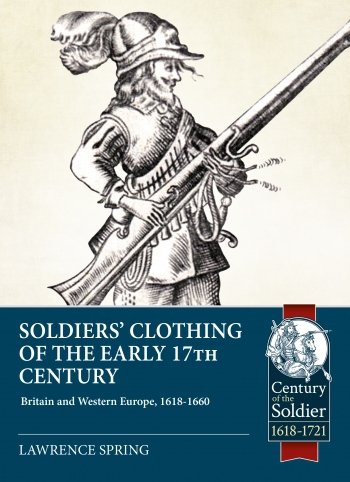-
Załączniki bezpieczeństwa
Załczniki do produktuZałączniki dotyczące bezpieczeństwa produktu zawierają informacje o opakowaniu produktu i mogą dostarczać kluczowych informacji dotyczących bezpieczeństwa konkretnego produktu
-
Informacje o producencie
Informacje o producencieInformacje dotyczące produktu obejmują adres i powiązane dane producenta produktu.HELION
-
Osoba odpowiedzialna w UE
Osoba odpowiedzialna w UEPodmiot gospodarczy z siedzibą w UE zapewniający zgodność produktu z wymaganymi przepisami.
Soldiers’ Clothing of the Early 17th Century is a comprehensive study of the clothing worn by soldiers during the Thirty Years War and the British Civil Wars. The book delves into the changing fashion trends of soldiers' clothing during the early seventeenth century, with detailed chapters on various items of clothing, the contracts and supply system, and challenges the idea that there was no uniformity at the beginning of the century.
There have been books written about military clothing during the early seventeenth century before, but never in this detail. This book is the result of over 30 years of research in the archives of record offices and libraries, recording minute details of clothing and coat colours. By examining thousands of archives and pamphlets, it challenges the idea that there was no uniformity within regiments or companies at the beginning of the century. Hundreds of contemporary illustrations, paintings and even surviving items of clothing were consulted to discover the soldiers' appearance.
The first part of Soldiers’ Clothing of the Early 17th Century looks at the individual items of clothing and how fashion changed over the years., as well as the contracts granted to merchants who supplied this clothing and the abuses that were made by some merchants and the corruption of the officers at the soldiers’ expense. Some soldiers were so poor that they had to sell their clothing to survive. It was also part of the humiliation of a prisoner of war to be stripped of his clothing. It also investigates the supply system of these clothes, which could further lead to corruption, and how they were transported to the armies to be distributed to the armies.
The second part looks at the clothing of the various Parliamentary and Royalist Armies, the army sent to Ireland during the 1640s, and the Scottish Armies during the Bishops’ and Civil Wars. It also attempts to solve the often-asked question of whether the trained bands were issued with clothing.
Finally, there is an examination of clothing issued to the armies of Denmark, the Dutch Republic, France, the Holy Roman Empire, Spain, and Sweden. Since soldiers’ clothing did not begin at the start of the Thirty Years War, in these chapters, the author looks at the issue of clothing from the turn of the century, if not before.
The book is essential for those interested in seventeenth-century military history, fashion, and re-enactors and wargamers of the period. Although the book does not include patterns and advice on how to make each item, it provides an in-depth and fascinating look at soldiers' clothing during the early seventeenth century.








